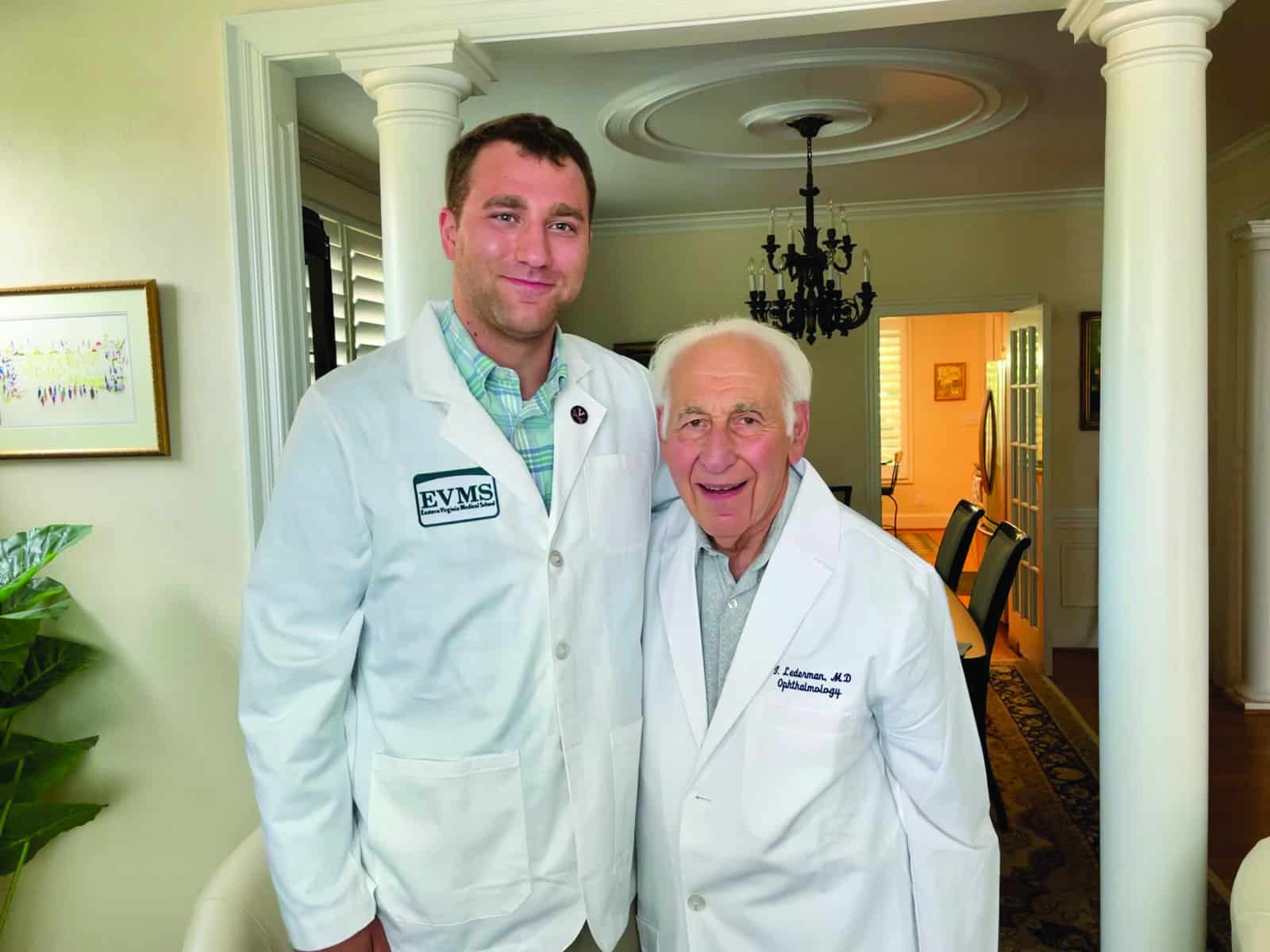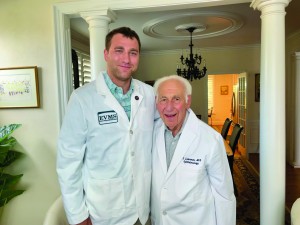“For many decades, Dr. Ira Lederman has been a blessing to the community,” says Rabbi Michael Panitz. “His service to a large circle of patients, and his leadership-by-example within Temple Israel and the South Hampton Roads Jewish community, have made our world a better place. He has helped us fulfill the Biblical quote,
‘By your light, oh God, do we see light.’“At a funeral in 2015,” Rabbi Panitz continues, “I witnessed the son of the deceased – in the depths of sadness –suddenly see Dr. Lederman in attendance.
The younger man’s countenance brightened, and he said: ‘Dr Lederman,
I must tell you this. When
I was a teen, seeking my way, you allowed me into the gallery to observe a surgery. It inspired me to take up my practice of ophthalmology. You have stood behind the good I have done in this world.’”
After more than 55 years in practice as an ophthalmologist in Tidewater, Ira Lederman, MD, is retiring on June 30, 2023.
At 86, he has had a very long and prestigious career, holding many important positions, including serving as president of the Virginia Ophthalmology Society and president of Temple Israel.
“He had very humble beginnings, as he grew up with his family of four in a one-bedroom apartment in Brooklyn, N.Y.,” says his daughter, Beth Johnson. “He was the first to attend college in his family.
“To this day, my father continues to see patients and has remained active in the medical community by volunteering his time interviewing medical student applicants for EVMS. His patients and the office staff love him. He has been practicing medicine for so long that in some cases he has been the ophthalmologist for families for three generations. He loves being a doctor and serving his patients and his community. I know his patients will miss him and he will miss them,” says Johnson.
“He has inspired my son (his grandson) who is currently a medical student at EVMS to follow in his footsteps.”
For his last day in the office, June 27, 2023, Lederman’s three children, Steve Lederman, Laura Marcus, and Beth Johnson scheduled appointments so they can be his last patients before retirement.
Looking toward his retirement from medicine, Jewish News took the opportunity to ask Dr. Lederman to reflect on his family, medical career, and how he got to Tidewater.
Jewish News: Where were you born and where did you grow up?
Ira Lederman: I was born and raised in Brooklyn, N.Y.
JN: Where did you receive your education?
IL: 1962: Graduated from Medical School: State University of NY (Downstate) in Brooklyn
1962-1963 Internship: Jewish Hospital of Brooklyn
1963 – 1966 Residency: Medical College of Virginia (now VCU)
While a resident also a NIH research trainee
1966-1968: Captain in US Army Medical Corps and Chief of Eye, Ear, Nose and Throat at Kenner Army Hospital at former Fort Lee, Virginia.
JN: Why did you choose ophthalmology?
IL: I wanted to do something that had medicine and surgery and in a field in which I could develop long-term relationships with patients.
Some patients I have seen over 50 years. Several patients I saw as children and are now on Medicare.
JN: Please tell us about your wife and children.
IL: I have been married for 62 years to Joan Lederman. I met my wife on a blind date (we are still friends with the woman who introduced us). I took her to her Senior Prom. My wife supported us for the first two years of our marriage working as a teacher. She went back to school after her children were in grade school and became a social worker at De Paul Hospital until her retirement.
I have three children: Steve Lederman, Laura Marcus (Jeff Marcus), and Beth Johnson (Brent Johnson). Steve is a Virginia Beach resident and Beth lived in Norfolk until October 2022 and now lives near Laura in Georgia.
I have eight grandchildren: Brock Johnson, Brannon Johnson, Melissa Marcus, Lindsey Marcus, Blair Lederman, Jason Marcus, Megan Lederman, and Sam Lederman – ranging from age 21 to 35.
JN: When do you begin practicing?
IL: 1966 – in the Army; July 1968 – in private practice.
JN: How and what year did you get to Norfolk?
IL: I moved to Norfolk in 1968 when I began private practice with Dr. Edwin Pearlman.
I moved my family to Norfolk after being offered a job with Dr. Pearlman. I did not have a contract or an agreed upon salary, but I felt comfortable with Edwin. In all the years we practiced together, we never had an argument.
The practice grew to include Dr. Bonnie Reshefsky around the 80’s.
After selling my practice, I worked with Verdi Eye Specialists.
JN: Where was your office at Wards Corner?
IL: My office was directly next to Norfolk Collegiate High School and near Temple Israel. We sold the building to NCS in 2010. The Meredith Arts Center now sits in that location. Our practice then moved to Granby Street in the 3900 block.
JN: Did you ever gather with the other doctors at Wards Corner? If so, what was that like?
IL: I had frequent lunches at Melvin’s deli with other Jewish physicians and dentists from the Wards Corner area. Later we ate at Uncle Louis’ and the Pancake House.
There was a lot of comradery and friendship that developed over the years. I will always cherish those memories.
JN: Have you experienced many changes in your field? If so, what changes, in your opinion, are for the better? And, what for the worse?
IL: First, the improvements:
When I first started, cataract surgery patients were hospitalized for a week for each eye. Now, cataract surgery is outpatient and takes much less time and the patients are sent home within a few hours. The incision is much smaller and often sutures are not required.
The biggest change was the introduction of the operating microscope and the Intraocular lens, and patients do not need the thick glasses they once had to wear years ago.
Also, now technicians play a prominent role in the ophthalmologist’s office. For about the first 10 years of my practice, the physician did the entire exam and testing by himself.
The introduction of electronic medical records is also good.
And now, the negatives:
There is much more paperwork than there used to be and more discussion with the insurance company. The interaction among physicians has been reduced because patients are in the hospital a shorter time, which has led to less collegiality and a reduction in professional courtesy.
JN: We understand that you treated Russians who arrived in Norfolk during the 1980s. Was language a barrier? How would you give an eye exam?
IL: There was frequent use of interpreters. The young members of the family often knew enough English to interpret for their parents.
JN: Will you share some special memories or highlights of your career?
IL: I had one patient that did not realize I was still working, and I had seen her as a child. Once she realized I was still working, she sent a lovely note telling me how much her life changed after her eye surgery. She was crossed eyed and was often teased by other children. I was able to do a surgical procedure so that her eyes no longer crossed.
There was no ophthalmic equipment at Beth Sholom Village, but I arranged with an anonymous donor to give more than $20,000 towards the purchase of various pieces of ophthalmic equipment.
Twenty years ago, I was carjacked at gunpoint outside of the office – it was a brand-new car with about 300 miles. The police caught the perpetrator within an hour. Apparently, the perpetrator had been offered $3,000 from a chop shop. During the police pursuit, he hit a telephone pole and totaled my car. I ended up buying a new car and received a $1,000 loyalty credit for being a repeat customer. What was particularly meaningful, was that Father Goumenis of the Greek Orthodox Church happened to be in the waiting room that day. He called me that night to find out how I was doing.
I had very close ties to many of my staff and enjoyed teasing and joking with them over the years. The most senior employee in the office was hired by me over 25 years ago, Clarita Chooran.
JN: Did you ever miss a day of work, other than scheduled vacation?
IL: Except for when I had a scheduled surgery or scheduled a vacation, I never missed a day of work.
When I was a resident, I had German Measles and as I was preparing to go to work, my wife stopped me.
JN: Where else have you worked?
IL: While I examined the vast majority of my patients at my office, I also spent time at Beth Sholom Village and Lake Taylor Transitional Care Hospital.
For many years, I volunteered at the De Paul Hospital Eye Clinic and the Eye Clinic at Norfolk General Hospital. I performed most of my eye surgeries at DePaul Hospital in Norfolk.
JN: Why did you wait until you were 86 to retire?
IL: Why would I retire and leave something so enjoyable and stimulating with the opportunity of helping others at the same time? Also, working allows me the ability to get to know so many wonderful people.
JN: What are your plans for after June 30?
IL: I plan to sleep in the mornings. I am not certain of my plans other than to spend more time alongside my wife. I may audit some college classes.
JN: Any other thoughts?
IL: My hobbies include painting and playing the piano. For my 60th birthday, my wife purchased art lessons for me. I painted over 50 oil paintings, including portraits of family members.
It is a bittersweet experience retiring after 55 years of practicing medicine and saying goodbye to patients, many of whom I have treated for 30 to 40 years.


